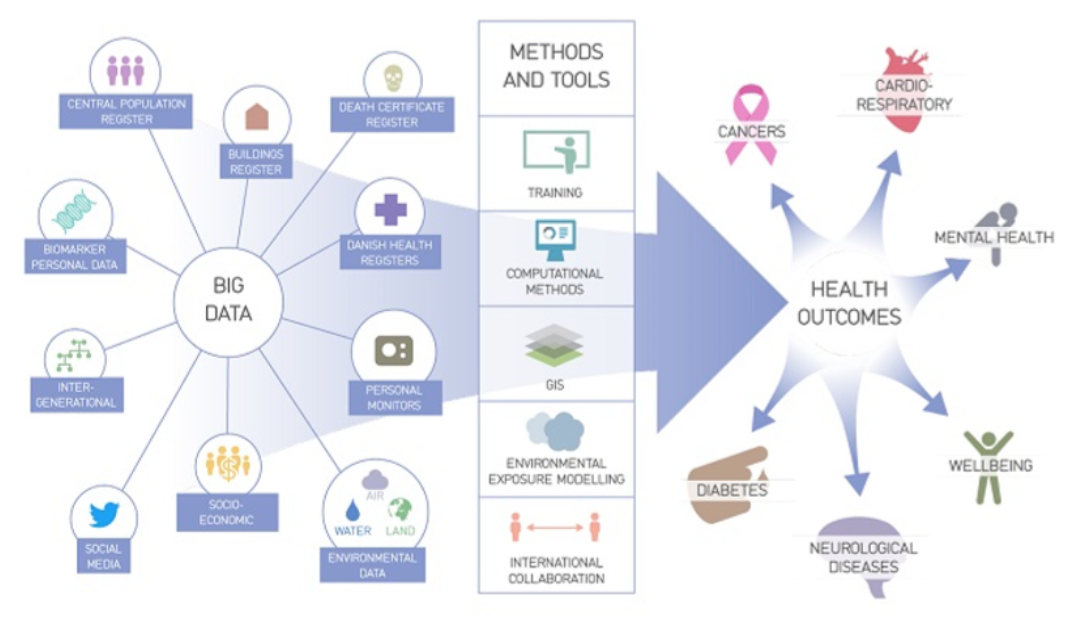Every year, 40 million people die globally of non-communicable diseases such as cancer and diabetes. And yet, we know very little about what triggers these diseases. Up to now. With DKK 60 million (EUR 8 million) from Novo Nordisk Foundation, researchers from Aarhus University are studying how our surroundings and choices in life affect our health.

Do you live in the countryside? Are you social with others? Do you have a university education?
These are some of the factors that staff at BERTHA (Big Data Centre for Environment and Health) investigate and analyse. The centre was set up to collect and connect big data about Danes, to find out what environmental and social impacts mean for an individual's health, quality of life and cause of death.
- Everyone dies from something. 200 years ago, people died of infectious diseases and poor hygiene, and today we are dying of diseases that we don't yet fully understand. We live longer than our bodies have been designed to, and we fall ill from cancer, Alzheimer's and mental illnesses. It’s important that we find out what causes the new diseases, says Professor Clive Sabel.
To understand what it is in our lives that triggers illness, Clive Sabel and his colleagues analyse information from and about Danes. The information they use in their research is collected from Danish registers, health data, smartphones and individuals.
- We generate huge amounts of data about ourselves during a lifetime. We report to a register every time we move home, we’re registered when we start a degree programme, and we measure ourselves on various apps. We all have data on our medical history in one place, and the Danish CPR register is unique. Only Denmark can give us access to such a fantastic amount of data, says Clive Sabel.
The researchers only receive data on Danes who have given their consent. The people whose data researchers use in their work know that they are participating in the research, and it is crucial for the project that the team behind BERTHA is extremely careful, stresses the professor.
- It’s vital that we take great care. Danes trust that they can submit information to the system without the information being misused. We take this trust very seriously, because if we give cause for mistrust, we won’t just be destroying a tradition. We’ll also be destroying our own access to data, and we’ll never find out whether there’s a pattern in the environment and life that causes illness, he explains.
The DKK 60 million from Novo Nordisk Foundation has been invested in recruiting and educating young researchers who want to analyse the vast amounts of data. The researchers are very close to the participating individuals and they try to form a picture of the person's life from birth up to the present.
- I can describe it like this. At birth, we all have an empty bucket, which fills up through life with environmental influences, emotions, experiences and so on. The bucket can become so full that we start to feel poorly and develop a disease. This may be due to our genes, but it may also be due to our environment. Our task is to find out what’s happening, says Clive Sabel.
The management behind the BERTHA project is composed of several professors from different departments at Aarhus University. Clive Sabel is a professor at the Department of Environmental Science, and he works with Professor Torben Sigsgaard from the Department of Public Health, Professor Carsten Bøcker Pedersen from the Department of Economics and Business Economics and Professor Ole Hertel from the Department of Environmental Science.
Today, it is generally known that exercise and a healthy diet have an impact on obesity, and that smoking can cause lung cancer. Over the years, this has encouraged smokers to stop smoking and those who are overweight to take exercise, and results from BERTHA will make a difference, hopes Clive Sabel.
- We may find that people who go through green areas on their way to work are less likely to become ill than others. The patterns we find should not spread fear in the population. We hope that we can find out what we can do in our daily lives to make us healthier, and that our results can help us to become more aware of what affects our health every day, he explains.
The grant from Novo Nordisk Foundation will go to six years of research, and the team behind BERTHA has great hopes for the centre's results.
- BERTHA will help establish Denmark as one of the few places where we can research into this area. The grant is absolutely vital, because even though Denmark has data, we couldn’t conduct research without the grant. This could be something big, says Clive Sabel.